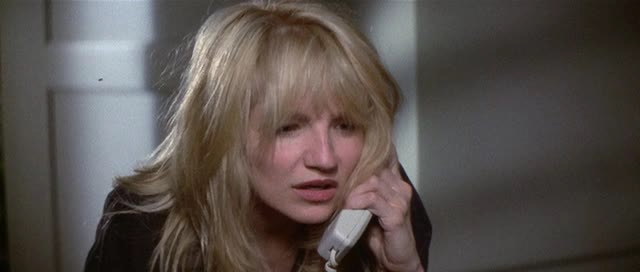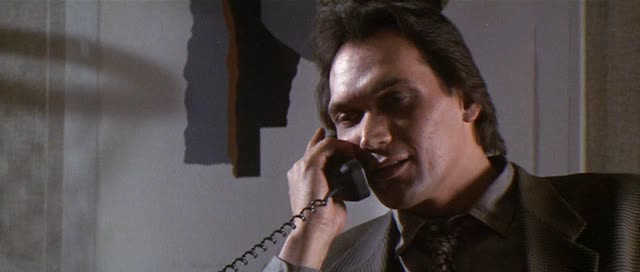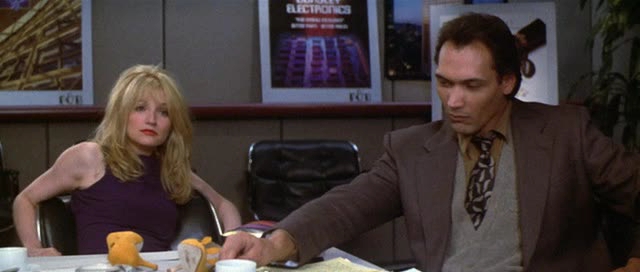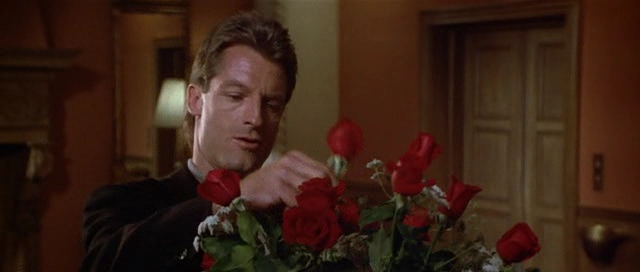From the Chicago Reader (May 17, 1991). — J.R.
SWITCH
* (Has redeeming facet)
Directed and written by Blake Edwards
With Ellen Barkin, Jimmy Smits, JoBeth Williams, Lorraine Bracco, Tony Roberts, Perry King, Lysette Anthony, and Victoria Mahoney.
In a review of Blake Edwards’s S.O.B. ten years ago, I was skeptical enough about his reputation as a trenchant social satirist that I called him the Perry Como of slapstick. Stylistically I think the comparison still holds — Switch, Edwards’s latest comedy, bears it out with a grim vengeance — but thematically the description may do Edwards’s work less than full justice. However Hollywood-style and boringly upscale the mid-life crises of the self-regarding womanizers in 10, S.O.B., The Man Who Loved Women, and Skin Deep may be, these are still troubled and neurotic movies; not for nothing did Edwards assign partial script credit to his own psychiatrist in The Man Who Loved Women.
I’m not saying that this element of disturbance makes Edwards a better writer or director, only that it gives him certain characteristics that belie the Perry Como comparison, including a taste for the grotesque and a penchant for self-analysis. Victor/Victoria and That’s Life! show a certain sweetness in dealing with middle-aged characters, and most of Edwards’s movies at least flirt with troubled reflections about sex rather than simply coast along on their Malibu-style furnishings. The usual problem, though, is that Edwards’s movies exploit neurosis for easy laughs more often than they use it as a means for exploration. When push comes to shove, he’s seldom willing to pursue his hang-ups to the limit; so it’s hardly accidental that the biggest laughs in Skin Deep, his previous film, came from glow-in-the-dark condoms, trotted out whenever the action threatened to flag.
Given this limitation, as well as the public’s relative lack of interest in middle-aged characters — the only ones Edwards has seemed interested in recently — I can’t say that I went to Switch with high expectations. But the sheer hollowness of the movie is enough to sap anyone’s spirits. Basically devoid of characters, ideas, and even feelings, it represents a kind of zero-degree expressiveness from a writer-director known for his personal touch. I wouldn’t go so far as to call the movie impersonal; on the contrary, Edwards’s blurry scrawl is visible in some measure on every frame. Yet the thematic and stylistic signs of this scrawl never convey the slightest sense of urgency or necessity — only evidence of habit. This may be a movie that lacks even the courage of its absence of convictions, but it also looks like the informed work of someone who’s been scripting movies for 45 years and directing them for 35 — a director who, in fact, is now pushing 70. Because the satire and plot in Switch are too thin to support Edwards’s analytical preoccupations, the Perry Como mode seems fully operative on a thematic level; comatose might be an even better epithet.
I wouldn’t presume to place all the blame on Edwards, although it’s hard to imagine that this movie’s central concept had many possibilities to begin with. A younger version of Edwards’s typical middle-aged hero — a male chauvinist advertising executive named Steve Brooks (Perry King) — is murdered in a hot tub by three former girlfriends (JoBeth Williams, Lysette Anthony, and Victoria Mahoney) at a “surprise party” thrown in his honor. Winding up in a conceptual version of purgatory — i.e., an empty soundstage penetrated by a single beam of light, where he’s addressed by a deity who speaks alternately in a male and female voice — he’s told that he’s been rotten to women, and the only way he can make it to heaven is to go back to earth and see if he can find someone female who truly likes him.
Since Edwards hasn’t bothered to give this character a single redeeming quality, it isn’t at all clear why God decides to give him a second chance — the whole setup seems perfunctory. But to activate the movie’s title turnabout, the devil promptly turns up — clearly a male, unlike his upstairs bisexual counterpart, and for obscure reasons speaking with an English accent. As the hero awakes to a new day, the devil appears in his apartment and begins arguing with the offscreen God that the only legitimate way to test the hero’s redemptive powers is to turn him into a woman. Perry King then abruptly turns into Ellen Barkin, and most of the rest of the movie is devoted to charting the complications of this sex change during the remainder of Brooks’s time on earth.
Properly speaking, however, the character Barkin plays isn’t a woman at all, but a man in a woman’s body — an important distinction, and one that immediately deprives this movie of most of the goofy and interesting effects it might have explored (and which were explored, up to a point, in such earlier reincarnation comedies as Goodbye Charlie and All of Me). Barkin does a fine job of parodying male body language, and her hobbling efforts on high heels provide just about the only visual wit in the movie — something Edwards may realize, because he brings this shtick back at every opportunity — but she can’t play a character because the script hasn’t provided her with one. Steve Brooks is not a character but a stock catalog of familiar sexist abuses; apparently the comic point is the incongruity of seeing Barkin spout these abuses, but because we never know anything about Brooks apart from this behavior, it’s a premise with diminishing returns. Not even King and Barkin combined add up to a single person.
The movie has a few other figures, but none of them qualify as characters either; they exist exclusively in order to reveal certain negative traits of Brooks’s or to keep the plot in fitful motion. Brooks’s best friend Walter (Jimmy Smits) functions first as confidant and eventually as sexual threat, but never as anyone in his own right. One of the ex-girlfriends (JoBeth Williams) hangs around so Brooks can blackmail her and acquire some women’s clothes; Brooks’s boss (Tony Roberts) and another advertising executive mainly function as straight men for the hero’s cocky one-liners. Sheila Faxton (Lorraine Bracco, a long way from GoodFellas), a lesbian who runs a cosmetics company and whom Brooks-as-Barkin brashly woos in order to get an advertising account for his firm, shows some fleeting signs of becoming a character, but Edwards gets rid of her as soon as he makes his point — that Brooks is so homophobic he can’t have sex with her.
Somewhere in all of this is a simple (ultimately essentialist) feminist message that is finally spelled out in a forced sentimental conclusion. And it seems possible that Edwards sincerely believes in this message without believing in any of the elaborate stage machinery — heaven and hell, male and female characters — that he obviously thinks is necessary in order to spell it out. Perhaps part of the problem can be traced to this movie’s improbable New York setting; Edwards’s spiritual turf is so restricted to southern California that his cursory efforts to suggest Manhattan only succeed in making this feeble movie take place nowhere.





